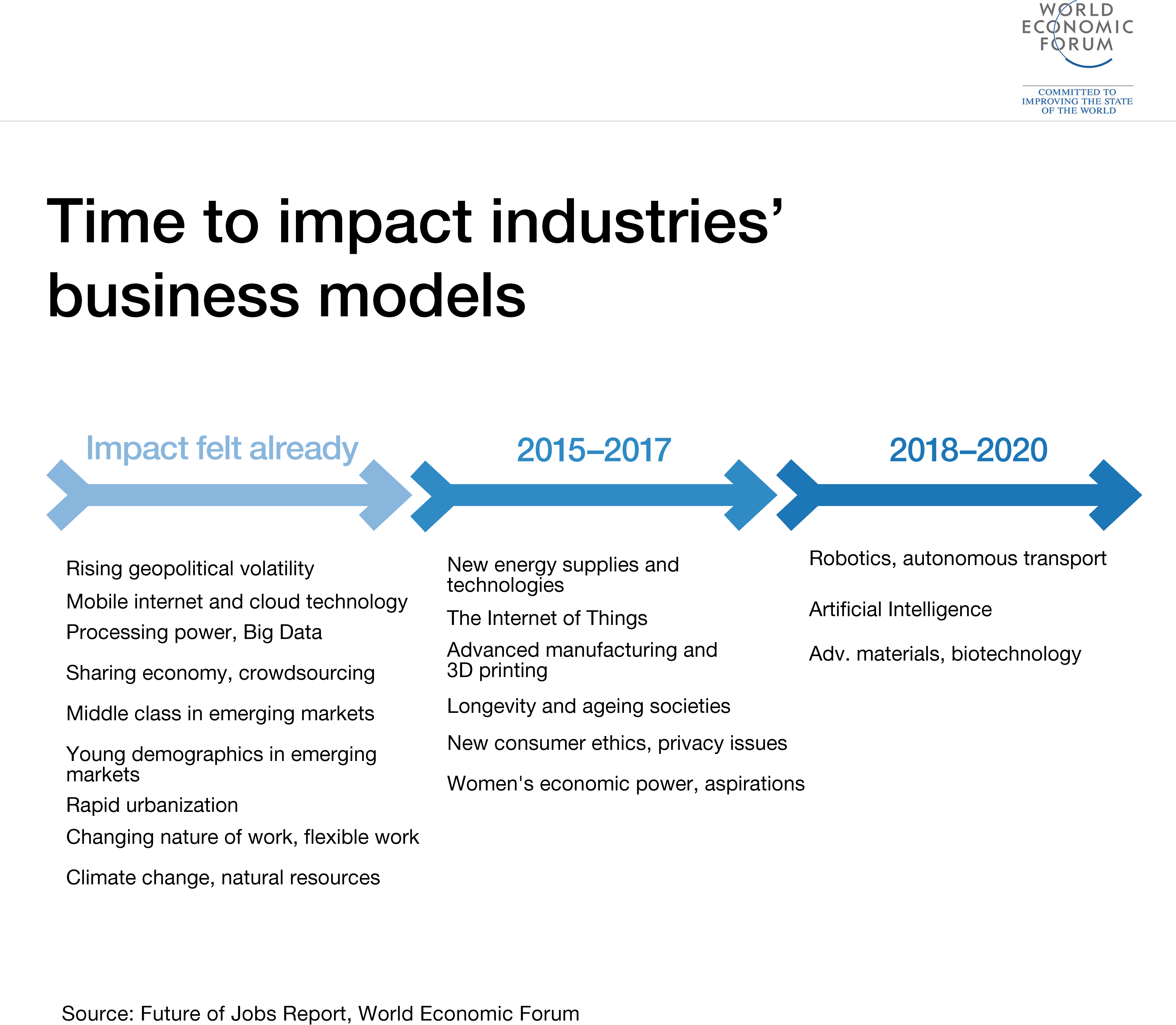How technology will change the future of work

The definition of an office is changing
Image: REUTERS/Stoyan Nenov
Stay up to date:
Hyperconnectivity
How many of us can say, with certainty, what jobs we would choose if we were kids today? The pace of technological change in the time I’ve been in work is only a shadow of what we will see over the next 15 to 20 years. This next wave of change will fundamentally reshape all of our careers, my own included.
It’s estimated that some 65% of children entering primary schools today will likely work in roles that don’t currently exist.
We expect the pace of change in the job market to start to accelerate by 2020. Office and administrative functions, along with manufacturing and production roles, will see dramatic declines accounting for over six million roles over the next four years. Conversely, business and financial operations along with computer and mathematical functions will see steep rises.

There is a central driver for many of these transformations, and it is technology.
Artificial intelligence, 3D printing, resource-efficient sustainable production and robotics will factor into the ways we currently make, manage and mend products and deliver services. The latter two have the potential to create jobs in the architectural and engineering sectors, following high demand for advanced automated production systems.
When the World Economic Forum surveyed global HR decision-makers, some 44% pointed to new technologies enabling remote working, co-working space and teleconferencing as the principal driver of change. Concurrently, advances in mobile and cloud technology allowing remote and instant access were singled out as the most important technological driver of change, enabling the rapid spread of internet-based service models.
It’s worth reflecting on how we could imagine a changed world like this.
Our future place of work might not be an open plan office, but interconnected workspaces not tied to one place, but many. They will be underpinned by virtual conferencing, complete and constant connection and portability.
Our working day will be fundamentally different. Leveraging big data, like real-time traffic information, could cut journey times, making the school run easier, and the morning commute more manageable. That is, if you have to commute: home-working will no longer be defined as a Friday luxury, but a more efficient way to work enabled by technology, taking the physical strain from megacities and regionalising work locations.
Technology underpinning what futurologists have christened ‘The Fourth Industrial Revolution’ will enable disruptive business models to decentralise our economies as we move from value systems based on ownership to ones enabling access. Personally owned assets, from cars to spare bedrooms, will expand entrepreneurship, diversifying revenue streams. It’s no fluke that within three years of trading, home-sharing platform Airbnb offers more rooms than some of the biggest hotel chains.
These disruptive business models will fundamentally reshape how we do business, both individually and as companies. For example, digitally enabling smallholder farmers can allow them to operate as a collective, transferring knowledge and sharing vital learnings with each other from proper crop irrigation technology to water efficiency. Cloud-based analytics hosted on BT’s Expedite platform can assist in radically transforming such supply chains.
Critically, these very technologies might help us unlock the solutions to some of the biggest societal challenges we currently grapple with. The ICT underpinning these technologies, in consort with the transformational power of big data, could support smart systems that will help tackle climate challenges. Connected homes, factories and farms leveraging smart energy management systems could mean dramatically lower energy use, which would contribute to the decarbonisation of our economies.
And yet we must be vigilant. Not of technological change; we have the power and innovation to harness and use its power as we see fit. But of access to the connectivity and opportunity it brings.
What will be absolutely decisive is how we equip our children, our students and our colleagues to harness the power of this technology to transform our world for the better. That means ensuring the ICT skills of current school leavers are fit for the future. It means providing incentives for lifelong learning as the pace of technological advancement quickens. And it means reinventing the HR function, equipping it to continually assess and provide for the training needs of employees.
If we get this right the prize is clear. We have the potential to revolutionise the way we live and work and do it in a way that avoids the vicissitudes of previous industrial revolutions, creating new economic opportunities that, even as children, we would not have before imagined.
Lastly, we must use every tool within our armoury to ensure the current and future generations are not left behind in the global digital skills race.
The Future of Jobs report is available here.
Don't miss any update on this topic
Create a free account and access your personalized content collection with our latest publications and analyses.
License and Republishing
World Economic Forum articles may be republished in accordance with the Creative Commons Attribution-NonCommercial-NoDerivatives 4.0 International Public License, and in accordance with our Terms of Use.
The views expressed in this article are those of the author alone and not the World Economic Forum.
Related topics:
Forum Stories newsletter
Bringing you weekly curated insights and analysis on the global issues that matter.
More on Fourth Industrial RevolutionSee all
Katia Moskvitch
April 14, 2025
Katia Moskvitch
April 9, 2025
Ibrahim Abdullah Alshunaifi and Caroline Tasse
April 3, 2025
Maria Alonso, Alex Koster and Paul Jordan
April 3, 2025
David Alexandru Timis
March 31, 2025




